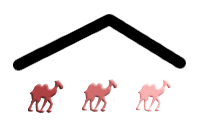The ranking algorithm behind GODI Search
- by Gerd Stolpmann,
2008-04-22
The question has always been: Are the results better if a search
engine really understands the text it indexes? You can view my latest
project,
GODI Search, as an
attempt to answer this question for a very limited set of documents,
namely the code and its documentation of
GODI, the source code O'Caml
distribution. Actually, understanding text allows it to rank the
results better, so that the more important occurrences of the query
words are shown more at the beginning of the result list. Because
ranking really bases on text interpretation, and the text is here a
variant of lambda code, I call this method LambdaRank.
As every search engine, GODI Search consists roughly of two main
components, namely the indexer and the searcher. The indexer iterates
over the set of documents, and populates a database with the words it
extracts. The searcher is the simpler part of the game, as it finds
everything well-prepared in this database, and when a query comes in,
it only has to pull the matching documents out of the database, sort
it according to the ranking score, and show it to the user. So the
tricky part is the indexing.
If you don't understand the text at all, you cannot do much about
ranking but count the occurrences of a word in a document. The idea
is that a text that speaks about a certain subject also mentions the
subject more often than other texts, and thus the number of occurrences
is a good measure for ranking.
In a document set where the texts are connected with hyperlinks one
can furthermore look at the relationships between the documents.
Google's PageRank is based on this approach (but, as rumors say,
is now heavily modified from its original design).
Fortunately, we know a lot about the document set GODI Search
analyzes. Most documents are like this:
O'Caml code files and closely corresponding manuals dominate the corpus.
GODI Search tries to make the best of this by analyzing O'Caml code in
detail.
After looking at many examples I had some ideas which occurrences must
be ranked higher than others.
Idea 1. Definitions of identifiers are more important than uses.
This sounds natural, but actually not every definition is important. GODI
Search also looks at the scope of the definition: A local definition is
restricted to a surrounding function, and scores the least. Then follow
definitions on module level, and in top-level modules. The highest score
is given to exported identifiers that occur in top-level module interfaces.
Only let-bound identifiers are ranked this way. Function arguments,
variables in pattern matchings, and fun-bound identifiers are ignored.
This is a bit arbitrary, but my feeling is that these identifiers are
usually not important in the coding styles I'm aware of.
For types, exceptions, and module names similar scoring techniques
exist.
Idea 2. Values and types are rated separately.
The namespace of all identifiers can be roughly divided into two big
zones: Values and types. Of course, there are more kinds of
identifiers (modules, classes, labels, file names,...), but my
impression is that the typical programmer has a mind set that is
dominated by only these two classes of symbols. In this sense, a
"value" names an executable thing, and a "type" names meta data. Both
have little to do with each other, and thus a document that contains
many words "list" as type has little importance in a search for "list"
as value.
Idea 3. Keywords are stopwords. Keywords occur in
practically every code file in big number, and thus say nothing about
it. GODI Search simply ignores keywords.
Idea 4. Qualified identifiers are hyperlinks. If you
search for "mem" then you will get a list of top-level definitions of
this function. The question is which occurrence is shown first. GODI
Search implements the PageRank idea of scoring hyperlinks pointing to
a document by looking at qualified identifiers. So if there are more
"Hashtbl.find" than "List.find" in code anywhere in the corpus, the
module "Hashtbl" scores higher than "List". (Actually, it is the other
way round if you also take other references into account.)
Idea 5. Code and non-code are rated separately.
Of course, the above applies only to text sections that are O'Caml code.
Other languages and non-code cannot be rated this way. For this reason,
GODI Search puts a lot of effort into separating both types of text.
Currently, this is done on a per-paragraph basis, i.e. every paragraph
is first analyzed in order to know whether it is O'Caml code or not.
Also, comments and string literals in code files are considered as
non-code.
So far about the ideas behind LambdaRank. The results of the
implementation look promising: If the user types in "fold_left" he or
she will be taken to really relevant occurrences. And user experience
is what counts, finally.


